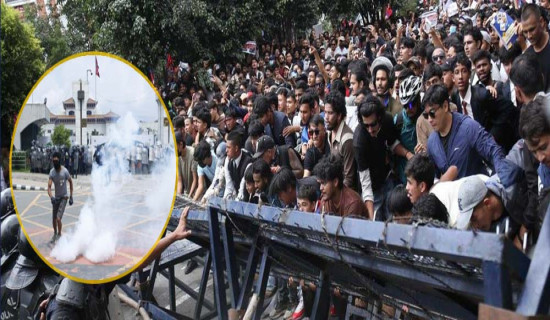- Tuesday, 9 September 2025
Rising Cholera Threat
Pallav Bhusal
Nepal, renowned for its natural beauty and cultural heritage, is currently confronting a public health menace: cholera. The 24 reported cases of cholera in 2024 serve as a stark reminder of our vulnerability to this deadly disease. Cholera, caused by the bacterium Vibrio cholerae, is highly infectious and can lead to severe dehydration and death if not treated promptly. This outbreak necessitates immediate and concerted efforts from all sectors to prevent a full-blown epidemic.
The dangers of cholera are both immediate and severe. Cholera spreads through contaminated water and food, making it a particular threat in areas with inadequate sanitation and poor access to clean drinking water conditions that are all too common in many parts of Nepal. The disease manifests rapidly, with symptoms ranging from mild diarrhoea to severe dehydration, which can kill within hours if untreated. The swiftness with which cholera can spread and the severity of its symptoms underscore the urgent need for effective prevention and control measures.
Nepal must take decisive steps to address the underlying causes of cholera and prevent further cases. First and foremost, improving access to clean water is essential. The government should prioritise infrastructure projects that provide safe drinking water to all communities, especially in rural and underserved areas. This could involve drilling new wells, maintaining and upgrading existing water systems, and ensuring that water sources are protected from contamination.
Equally important is the enhancement of sanitation facilities. Public awareness campaigns can play a critical role in educating people about the importance of using toilets, practicing good hygiene, and properly disposing of waste. The construction of adequate sanitation facilities, particularly in areas prone to flooding, can prevent the contamination of water sources and reduce the spread of cholera.
Healthcare facilities also need to be strengthened to handle potential outbreaks. Rapid response teams should be trained and equipped to identify and treat cholera cases quickly. This includes ensuring that healthcare workers have access to rehydration solutions, antibiotics, and other necessary supplies. Additionally, establishing more cholera treatment centres in strategic locations can help manage and contain outbreaks more effectively.
Vaccination campaigns should be another key component of Nepal’s cholera prevention strategy. The oral cholera vaccine has proven to be an effective tool in controlling outbreaks and providing temporary immunity to at-risk populations. The government should organise mass vaccination drives, particularly in areas with previous cholera outbreaks. Moreover, Nepal should invest in robust surveillance systems to monitor the spread of cholera and other infectious diseases. Early detection and prompt reporting of cases can enable quicker responses and limit the spread of the disease. This requires training local health workers in disease surveillance and ensuring that they have the necessary tools and resources.
Community engagement is vital in the fight against cholera. Local leaders, community health workers, and volunteers can help disseminate information about cholera prevention and ensure that community members are aware of the measures they need to take to protect themselves. Grassroots efforts can often reach individuals and families more effectively than top-down government directives.
Finally, partnering with international organisations like the World Health Organisation (WHO) and UNICEF can provide technical expertise, funding, and resources needed to implement comprehensive cholera prevention programs. The recent cholera cases in Nepal highlight the urgent need for a multi-faceted approach to prevent further outbreaks. By improving access to clean water, enhancing sanitation facilities, strengthening healthcare systems, promoting vaccination, investing in surveillance, and engaging communities, Nepal can protect its citizens from the dangers of cholera. The time to act is now, before more lives are put at risk.

















